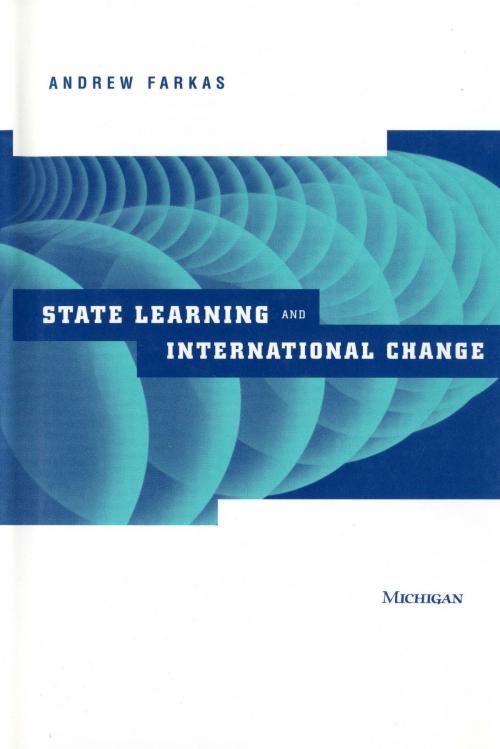| Author: | Andrew Farkas | ISBN: | 9780472027347 |
| Publisher: | University of Michigan Press | Publication: | August 27, 2010 |
| Imprint: | University of Michigan Press | Language: | English |
| Author: | Andrew Farkas |
| ISBN: | 9780472027347 |
| Publisher: | University of Michigan Press |
| Publication: | August 27, 2010 |
| Imprint: | University of Michigan Press |
| Language: | English |
Explaining change in the behavior of states and other international actors is at the core of the study of international relations. The proficiency with which states respond to changes in the international environment has important consequences for world peace and the world economy as well as domestic politics and well being. One way to understand changes in behavior is to consider whether and how states learn. Key to understanding this is considering how the groups responsible for making decisions learn and make decisions.
Andrew Farkas presents an evolutionary theory of how states adjust their foreign policies in response to international changes. Employing both formal models and computer simulations, Farkas explores the relative efficacy of a wide range of alternative strategies for dealing with unanticipated changes in the international environment, and goes a long way toward reconciling the success of rational choice modeling with criticism from psychological studies of decision making.
Farkas looks at the way small groups charged with making policy decisions work. He explicitly models the process of search and policy selection. He demonstrates how a group of disparate individuals can act as if it were a unitary rational actor and provides the first endogenous account of when and why groups curtail their search for satisfactory policies. Farkas uses the general model to explore the effects of different institutional designs on the decisionmaking process.
This book will be of interest to scholars of international relations, learning models and group processes.
Andrew Farkas is Assistant Professor of Political Science, Rutgers University.
Explaining change in the behavior of states and other international actors is at the core of the study of international relations. The proficiency with which states respond to changes in the international environment has important consequences for world peace and the world economy as well as domestic politics and well being. One way to understand changes in behavior is to consider whether and how states learn. Key to understanding this is considering how the groups responsible for making decisions learn and make decisions.
Andrew Farkas presents an evolutionary theory of how states adjust their foreign policies in response to international changes. Employing both formal models and computer simulations, Farkas explores the relative efficacy of a wide range of alternative strategies for dealing with unanticipated changes in the international environment, and goes a long way toward reconciling the success of rational choice modeling with criticism from psychological studies of decision making.
Farkas looks at the way small groups charged with making policy decisions work. He explicitly models the process of search and policy selection. He demonstrates how a group of disparate individuals can act as if it were a unitary rational actor and provides the first endogenous account of when and why groups curtail their search for satisfactory policies. Farkas uses the general model to explore the effects of different institutional designs on the decisionmaking process.
This book will be of interest to scholars of international relations, learning models and group processes.
Andrew Farkas is Assistant Professor of Political Science, Rutgers University.















